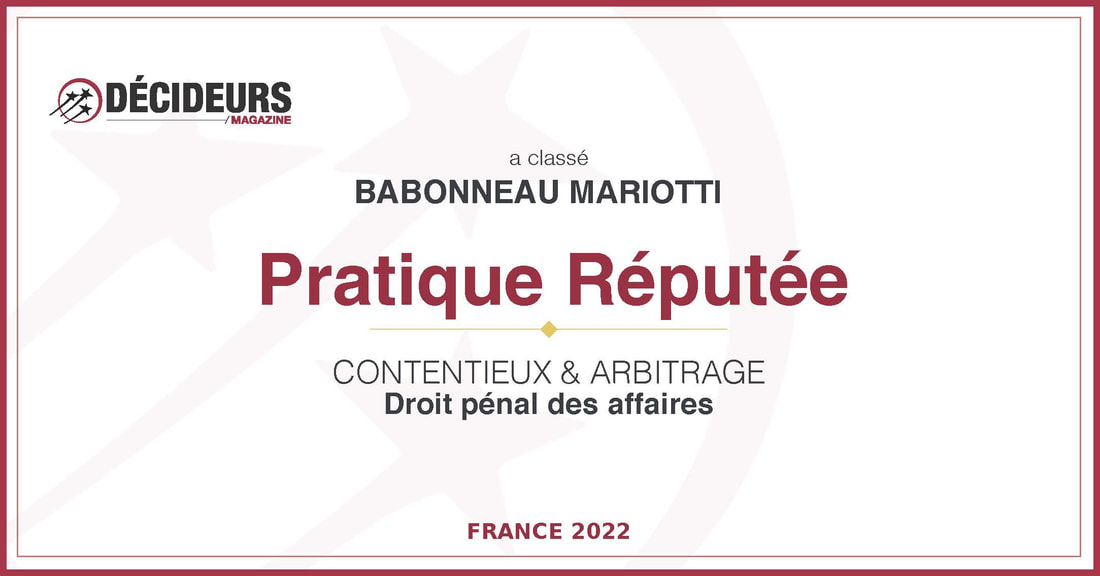a team of experts EXCLUSIVELY |
|
OUR PEOPLE
|
BABONNEAU-MARIOTTI brings together a team of experienced lawyers and experts in criminal law, led by Stéphane Babonneau and Eduardo Mariotti. Every week, our lawyers and associates work alongside our clients in courts, investigation services and detention facilities. |
CUSTODY
As soon as the custody is notified,, the suspect his relatives can proceed to the appointment of a criminal lawyer in order to assist throughout the procedure.
The best results are achieved when the the lawyer is present as of the begining of the custody.
When our firm is appointed to act on behalf of a person in custody, we immediately contact the investigating service to inform them of our intervention.
24/7 we dispach an experienced criminal defence attorney within two hours as of the confirmation of the intervention.
The best results are achieved when the the lawyer is present as of the begining of the custody.
When our firm is appointed to act on behalf of a person in custody, we immediately contact the investigating service to inform them of our intervention.
24/7 we dispach an experienced criminal defence attorney within two hours as of the confirmation of the intervention.
Criminal summons
Have you received a summons recently (or less recently) and have not yet been able to contact a criminal lawyer?
Whatever the date and time of this summons, we can assist even on a very short notice (the same day!).
Our lawyers may act whatever the situation is.
As of our appointment, an experienced criminal attorney will contact the court to obtain a copy of the casefile.
After an in-depth analysis of the case, a defense strategy is proposed to the client by the criminal lawyer in charge of his case.
Intensive preparation of the client in the office is then ensured before the appearance.
Whatever the date and time of this summons, we can assist even on a very short notice (the same day!).
Our lawyers may act whatever the situation is.
As of our appointment, an experienced criminal attorney will contact the court to obtain a copy of the casefile.
After an in-depth analysis of the case, a defense strategy is proposed to the client by the criminal lawyer in charge of his case.
Intensive preparation of the client in the office is then ensured before the appearance.
INCARCERATED IN FRANCE
We regularly assist foreign inmates detained in France in order to ensure that they receive the necessary information about their rights during their detention time.
We also handle petitions for parole on behalf of our clients, ensuring that their request is appropriately presented and meets the conditions to be the board pf detention.
Our attroneys are trained in prison laws and advocate on behalf of our international clients all over the French territory.
The scope of our interventions also encompasses the conditions of incarceration in order to ensure that the dignity of the inmates is respected during their detention time.
We also handle petitions for parole on behalf of our clients, ensuring that their request is appropriately presented and meets the conditions to be the board pf detention.
Our attroneys are trained in prison laws and advocate on behalf of our international clients all over the French territory.
The scope of our interventions also encompasses the conditions of incarceration in order to ensure that the dignity of the inmates is respected during their detention time.
WHY TRUSTING US
|
Since 2016, the attorneys of BABONNEAU MARIOTTI handled successfully several thousand cases before criminal courts throughout France and French overseas territories.
365 days a year, our attorneys go where our clients need us, in investigation services, police stations, courts, detention facilities and generally wherever a person's future is at stake. At BABONNEAU MARIOTTI – AVOCATS PENALISTES we consider that there is no case lost in advance, no indefensible case, no hopeless situation. Because criminal defense is our passion, our lawyers carry the voice of our clients all over the criminal justice system whatever the circumstances, with determination and tenacity. Criminal law and procedure being highly technical and constantly evolving subjects, like our society, our criminal lawyers are constantly trained in the most effective defense techniques and continually share their successes, and sometimes their failures, so that our common experience can grow. Choosing BABONNEAU MARIOTTI means benefiting from the experience acquired by our lawyers through the processing of several thousand cases over the past years. It is also the assurance of seeing your case followed by a criminal lawyer dedicated to build the best possible defense and walk you through difficult times. |
INTERNATIONAL
|
Since its creation, a significant part of the activity of BABONNEAU MARIOTTI - AVOCATS PENALISTES concerns international criminal law.
In this way, we assist those accused or victims of offenses abroad. All of the firm's criminal lawyers and associates are bilingual or trilingual and work in conjunction with foreign lawyers or authorities in Europe and around the world. We have thus assisted clients confronted with criminal law issues in Europe, North and South America, the Middle East, Asia and Africa. We also work regularly with clients targeted by European or international arrest warrants or subject to extradition procedures. The firm's lawyers also intervene before the Interpol file control commission to request the erasure of abusive red notices. We also assist victims of offenses abroad in order to assist them in the context of their defense and their compensation in France by the CIVI. BABONNEAU MARIOTTI - AVOCATS PENALISTES is also on the list of English-speaking criminal lawyers involved in criminal law established by the embassies of the United States of Great Britain and Singapore . The firm also collaborates regularly with the Brazilian Embassy. |
CRIMINAL LAW EMERGENCY
|
A dedicated team handles criminal emergencies (i.e. cases requiring the immediate assistance of a criminal lawyer), in particular in the event of an arrest, custody, search in progress, appearance before the prosecutor's office or the criminal court.
We accept new urgent assignments 24 hours a day, 7 days a week wherever we are needed. After confirmation of acceptance of the case, we dispatch a criminal attorney within two hours in the Pari area. In case of an emergency, contact us by phone or email providing as much information as possible. |
|
|
BABONNEAU MARIOTTI - AVOCATS PÉNALISTES
262 boulevard Saint-Germain
75007 Paris
______________________________
The reception takes calls without interruption from Monday to Friday from 8:00 a.m. to 8:00 p.m. and Saturday from 9:00 a.m. to 12:00 p.m.
Outside of office hours, in the event of a criminal emergency, a criminal attorney from the firm can be contacted via the form or at the email address below.
For absolute emergencies, a callback is generally guaranteed within 30 minutes.
Tél : 01 86 95 43 10
Fax : 01 86 95 43 11
Mail : [email protected]
262 boulevard Saint-Germain
75007 Paris
______________________________
The reception takes calls without interruption from Monday to Friday from 8:00 a.m. to 8:00 p.m. and Saturday from 9:00 a.m. to 12:00 p.m.
Outside of office hours, in the event of a criminal emergency, a criminal attorney from the firm can be contacted via the form or at the email address below.
For absolute emergencies, a callback is generally guaranteed within 30 minutes.
Tél : 01 86 95 43 10
Fax : 01 86 95 43 11
Mail : [email protected]






